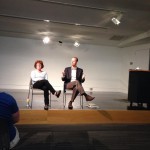Capital In the 21st Century – A Conversation Recap
posted: , by PPLtags: Programs & Events | Recommended Reads | Adults | Teens | Seniors | Business | Government
On Tuesday, June 24th, Portland Public Library’s Choose Civility Initiative and City of Reader’s Team hosted Dr. Susan Feiner, USM professor of economics and gender and women studies and Garrett Martin, executive director of Maine Center for Economic Policy to help us better understand the work of Thomas Piketty and the book Capital in the 21st Century.
More than 40 people attended the event, out of curiosity about the ideas in the book and also curiosity about why this particular book became such a bestseller at this time. Those who couldn’t make it can find some tidbits and links at our dedicated Twitter hastag #pplpiketty.
Anyone who would like to sink teeth into text, please contact Jason who would like to organize a reading group around the book (this is NOT a library sponsored call but a private one).

If you’d like further information or an opportunity to explore the ideas more, please let us know in the comments section or by email. Similarly, if you have ideas for other programs based on current nonfiction, we’d love to know what you’re curious about!
And, for more reading suggestions, check out our book list, updated to include suggestions from the panelists.


